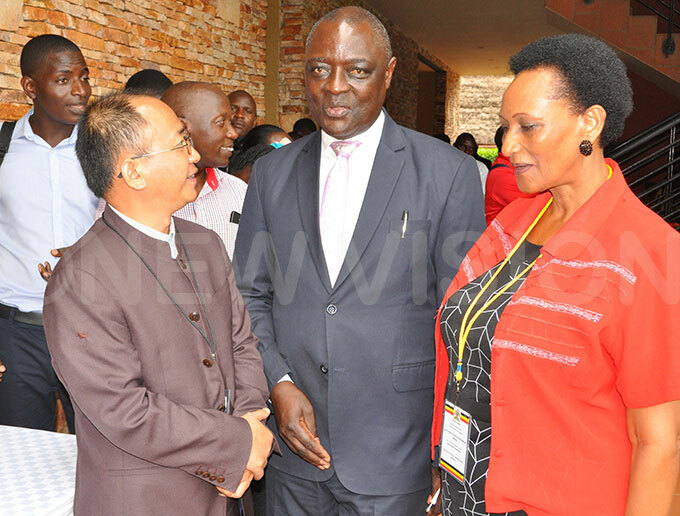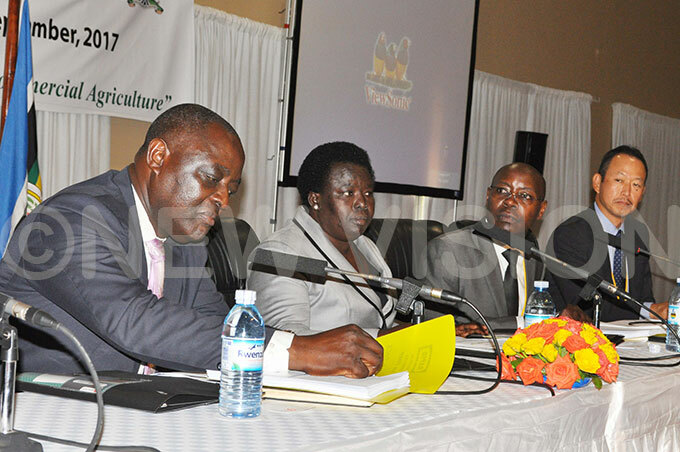MAAIF to intensify production of commodities for export
Sep 28, 2017
To that effect the Ministry of Agriculture has prioritized 13 commodities that will be positioned for exports.

For the next three years, Government will intensify the productivity of agriculture products for exports. This is because 53% of Uganda's exports come from agriculture, contributing 23.6% to GDP.
To that effect the Ministry of Agriculture has prioritized 13 commodities that will be positioned for exports. These include traditional exports like coffee, tea, cotton, cocoa .Others include mango, citrus, maize, bananas, beans and dairy heifers.
This was revealed by the Minister of Agriculture Animal Industry and Fisheries (MAAIF), Vincent Ssempijja on Wednesday, during the annual joint agriculture sector review meeting at Speke Resort Munyonyo.
The sector review was aimed at examining the sector performance and challenges with a view of defining viable options and roadmap for agriculture transformation in Uganda.
This year's theme is ‘Accelerating agriculture transformation from subsistence farming to commercial farming'.
 The team leader and agri-business expert for South Cooperation project Wu Zhiping (left), the minister of agriculture animal industry and fisheries Vincent Ssempija Bamulangaki and the resident city commissioner (RCC) Kampala Capital City, Deborah Mbabazi (Right) interacting
The team leader and agri-business expert for South Cooperation project Wu Zhiping (left), the minister of agriculture animal industry and fisheries Vincent Ssempija Bamulangaki and the resident city commissioner (RCC) Kampala Capital City, Deborah Mbabazi (Right) interacting
For the sector to achieve its targets, the ministry is addressing challenges facing the sector such as pests and disease, effects of climate change, fake agro inputs, and lack of seed for horticulture products among others.
For horticulture products, the minister said they have asked the National Agriculture Research Organization (NARO) to produce seeds for horticulture so that farmers can source seed within Uganda.
"Most horticulture seeds like cabbage, tomatoes, onions are imported which is quite expensive but still one can make more profits by growing them and recover the money spent in the process of importing," said Ssempija.
He also added that before the year ends, they will have registered all agents of agro inputs to stamp out the issue of fake inputs as these are important for production and productivity.
Through the registration process, agro input dealers or agents will be required to have confirmation from the manufacturers of products they are selling to prove that they are their agents.
On issues of climate change, Ssempija said they are promoting small scale irrigation technologies targeting the small holder farmers who contribute 68% of the country's population and they are the main producers of food.
The above efforts will be supplemented by the directorate of extension, which the minister said will be operational in all sub counties next year, following the recruitment of extension staff.
 (From L-R) Minister of Agriculture Animal Industry and Fisheries (MAAIF) Vincent Ssempija, the chairperson agricultural committee Lowila Oketayot , the permanent secretary ministry of agriculture Pius Wakabi and the chief Rrepresentative Japan International Cooperation Agency Uganda (JICA) Kyosuke Kawazumi during the 7th MAAIF joint annual review workshop
(From L-R) Minister of Agriculture Animal Industry and Fisheries (MAAIF) Vincent Ssempija, the chairperson agricultural committee Lowila Oketayot , the permanent secretary ministry of agriculture Pius Wakabi and the chief Rrepresentative Japan International Cooperation Agency Uganda (JICA) Kyosuke Kawazumi during the 7th MAAIF joint annual review workshop
However the director extension, Beatrice Byarugaba said they are continuing with capacity building of the staff that she said need skills, knowledge and approaches necessary for effective extension service delivery.
From research, Dr.Yona Baguma, the deputy Director General of NARO said they have developed crops that can with stand effects of climate change.
These include drought tolerant and early maturing rice, resistant coffee varieties to the coffee wilt disease, cassava that is resistant to viruses. They have also controlled diseases in citrus like citrus canker maize varieties that are tolerant to stress, among others.
"These will ensure continuous production so as to have enough for export, home consumption and food security," said Baguma.
He however called for more funding to the sector, and the passing of the Biotechnology and Biosafety bill into law, to allow them use biotechnology to quicken research work and release of varieties that can cope with the changing weather.
